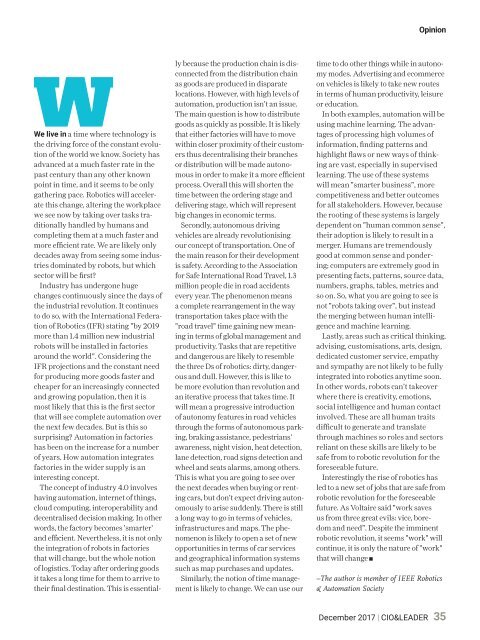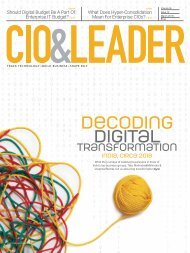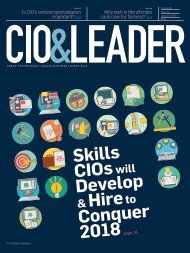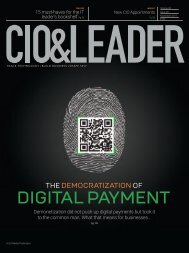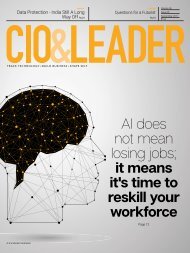C&L_December 2017 (1)
You also want an ePaper? Increase the reach of your titles
YUMPU automatically turns print PDFs into web optimized ePapers that Google loves.
Opinion<br />
WWe<br />
live in a time where technology is<br />
the driving force of the constant evolution<br />
of the world we know. Society has<br />
advanced at a much faster rate in the<br />
past century than any other known<br />
point in time, and it seems to be only<br />
gathering pace. Robotics will accelerate<br />
this change, altering the workplace<br />
we see now by taking over tasks traditionally<br />
handled by humans and<br />
completing them at a much faster and<br />
more efficient rate. We are likely only<br />
decades away from seeing some industries<br />
dominated by robots, but which<br />
sector will be first?<br />
Industry has undergone huge<br />
changes continuously since the days of<br />
the industrial revolution. It continues<br />
to do so, with the International Federation<br />
of Robotics (IFR) stating "by 2019<br />
more than 1.4 million new industrial<br />
robots will be installed in factories<br />
around the world". Considering the<br />
IFR projections and the constant need<br />
for producing more goods faster and<br />
cheaper for an increasingly connected<br />
and growing population, then it is<br />
most likely that this is the first sector<br />
that will see complete automation over<br />
the next few decades. But is this so<br />
surprising? Automation in factories<br />
has been on the increase for a number<br />
of years. How automation integrates<br />
factories in the wider supply is an<br />
interesting concept.<br />
The concept of industry 4.0 involves<br />
having automation, internet of things,<br />
cloud computing, interoperability and<br />
decentralised decision making. In other<br />
words, the factory becomes 'smarter'<br />
and efficient. Nevertheless, it is not only<br />
the integration of robots in factories<br />
that will change, but the whole notion<br />
of logistics. Today after ordering goods<br />
it takes a long time for them to arrive to<br />
their final destination. This is essentially<br />
because the production chain is disconnected<br />
from the distribution chain<br />
as goods are produced in disparate<br />
locations. However, with high levels of<br />
automation, production isn't an issue.<br />
The main question is how to distribute<br />
goods as quickly as possible. It is likely<br />
that either factories will have to move<br />
within closer proximity of their customers<br />
thus decentralising their branches<br />
or distribution will be made autonomous<br />
in order to make it a more efficient<br />
process. Overall this will shorten the<br />
time between the ordering stage and<br />
delivering stage, which will represent<br />
big changes in economic terms.<br />
Secondly, autonomous driving<br />
vehicles are already revolutionising<br />
our concept of transportation. One of<br />
the main reason for their development<br />
is safety. According to the Association<br />
for Safe International Road Travel, 1.3<br />
million people die in road accidents<br />
every year. The phenomenon means<br />
a complete rearrangement in the way<br />
transportation takes place with the<br />
"road travel" time gaining new meaning<br />
in terms of global management and<br />
productivity. Tasks that are repetitive<br />
and dangerous are likely to resemble<br />
the three Ds of robotics: dirty, dangerous<br />
and dull. However, this is like to<br />
be more evolution than revolution and<br />
an iterative process that takes time. It<br />
will mean a progressive introduction<br />
of autonomy features in road vehicles<br />
through the forms of autonomous parking,<br />
braking assistance, pedestrians'<br />
awareness, night vision, heat detection,<br />
lane detection, road signs detection and<br />
wheel and seats alarms, among others.<br />
This is what you are going to see over<br />
the next decades when buying or renting<br />
cars, but don't expect driving autonomously<br />
to arise suddenly. There is still<br />
a long way to go in terms of vehicles,<br />
infrastructures and maps. The phenomenon<br />
is likely to open a set of new<br />
opportunities in terms of car services<br />
and geographical information systems<br />
such as map purchases and updates.<br />
Similarly, the notion of time management<br />
is likely to change. We can use our<br />
time to do other things while in autonomy<br />
modes. Advertising and ecommerce<br />
on vehicles is likely to take new routes<br />
in terms of human productivity, leisure<br />
or education.<br />
In both ex<strong>amp</strong>les, automation will be<br />
using machine learning. The advantages<br />
of processing high volumes of<br />
information, finding patterns and<br />
highlight flaws or new ways of thinking<br />
are vast, especially in supervised<br />
learning. The use of these systems<br />
will mean "smarter business", more<br />
competitiveness and better outcomes<br />
for all stakeholders. However, because<br />
the rooting of these systems is largely<br />
dependent on "human common sense",<br />
their adoption is likely to result in a<br />
merger. Humans are tremendously<br />
good at common sense and pondering;<br />
computers are extremely good in<br />
presenting facts, patterns, source data,<br />
numbers, graphs, tables, metrics and<br />
so on. So, what you are going to see is<br />
not "robots taking over", but instead<br />
the merging between human intelligence<br />
and machine learning.<br />
Lastly, areas such as critical thinking,<br />
advising, customisations, arts, design,<br />
dedicated customer service, empathy<br />
and sympathy are not likely to be fully<br />
integrated into robotics anytime soon.<br />
In other words, robots can't takeover<br />
where there is creativity, emotions,<br />
social intelligence and human contact<br />
involved. These are all human traits<br />
difficult to generate and translate<br />
through machines so roles and sectors<br />
reliant on these skills are likely to be<br />
safe from to robotic revolution for the<br />
foreseeable future.<br />
Interestingly the rise of robotics has<br />
led to a new set of jobs that are safe from<br />
robotic revolution for the foreseeable<br />
future. As Voltaire said "work saves<br />
us from three great evils: vice, boredom<br />
and need". Despite the imminent<br />
robotic revolution, it seems "work" will<br />
continue, it is only the nature of "work"<br />
that will change<br />
–The author is member of IEEE Robotics<br />
& Automation Society<br />
<strong>December</strong> <strong>2017</strong> | CIO&LEADER<br />
35


